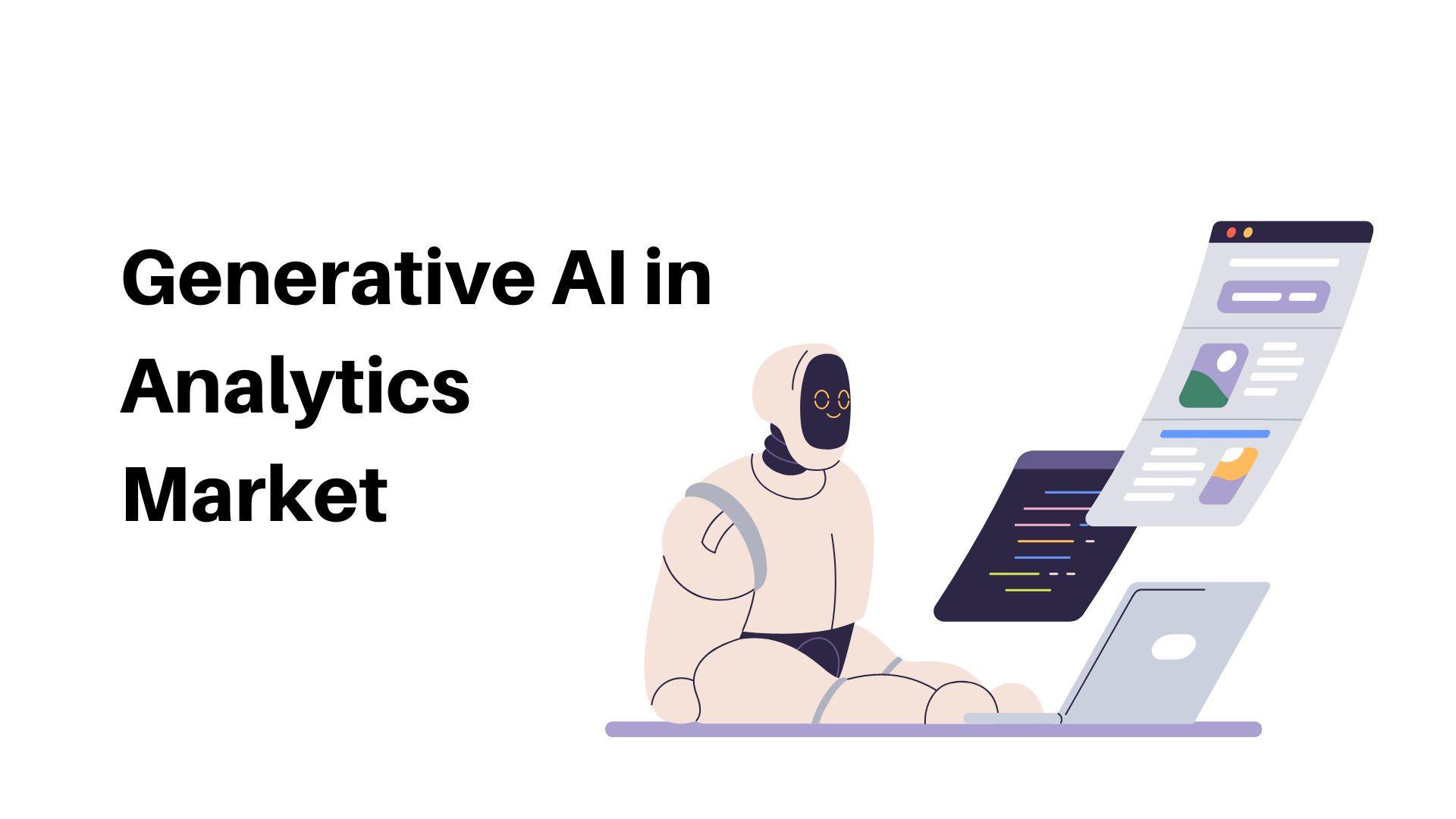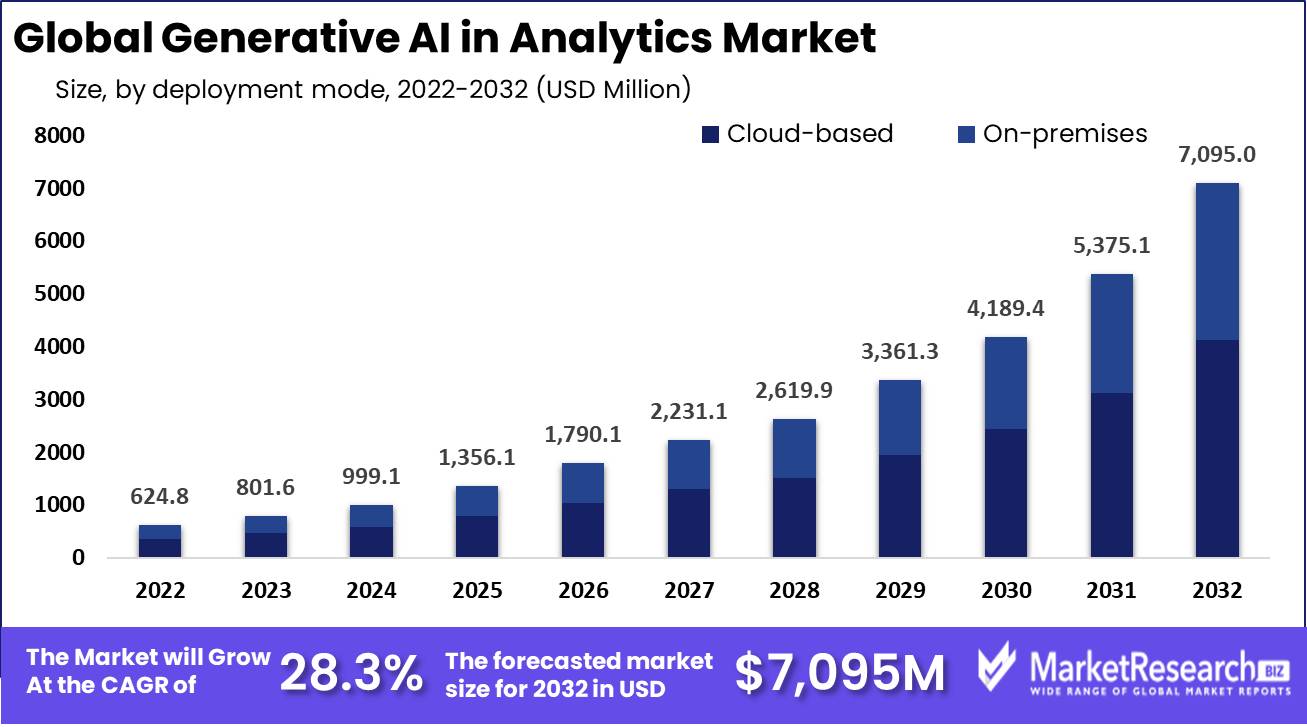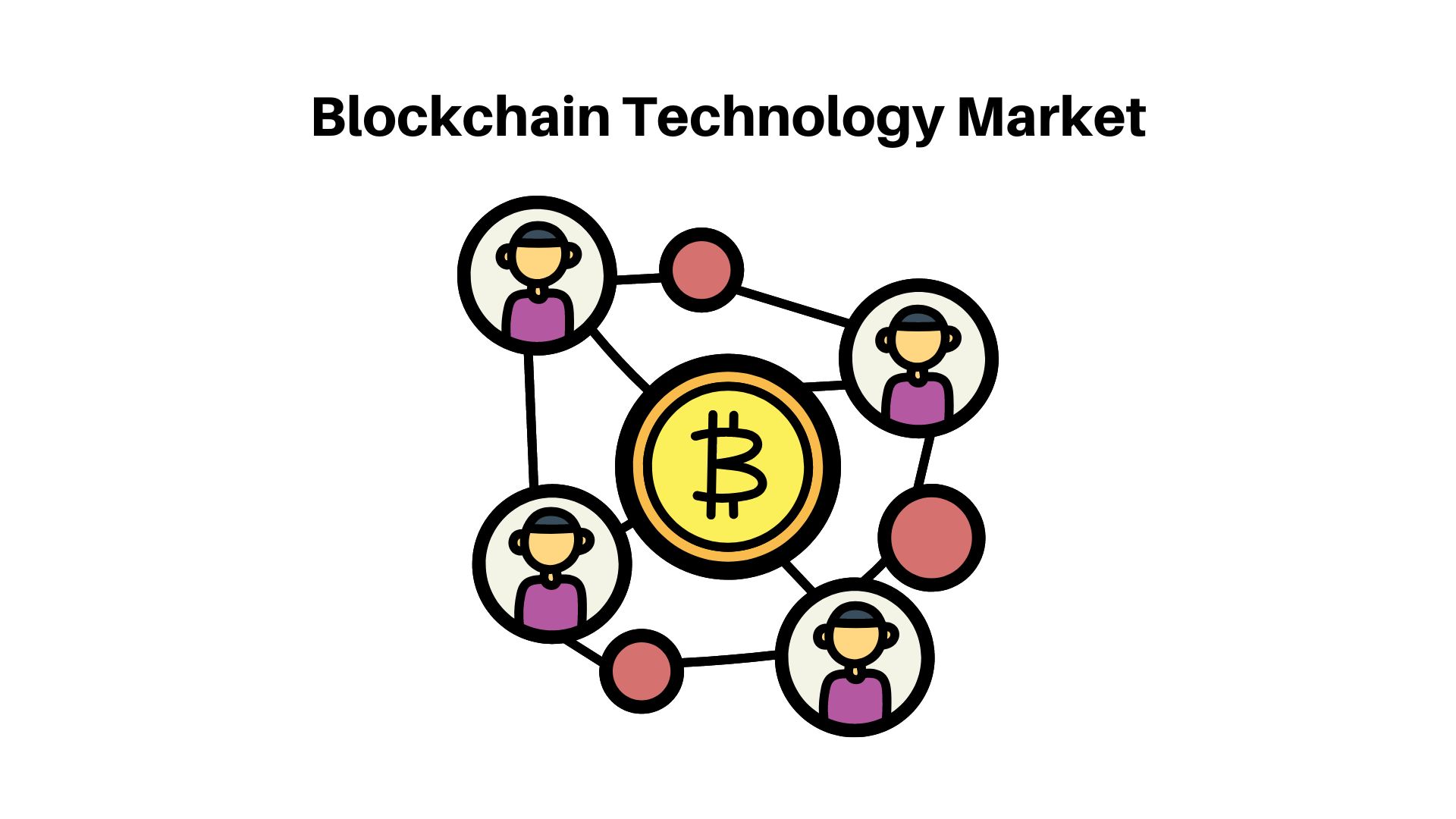Generative AI in Analytics Market size is expected to be worth around USD 7,095 Mn by 2032

Page Contents
Market Overview
Published Via 11Press : Generative AI in Analytics Market size is expected to be worth around USD 7,095 Mn by 2032 from USD 624.8 Mn in 2022, growing at a CAGR of 28.3% during the forecast period from 2023 to 2032.
Generative AI analytics have experienced impressive growth and advancement over recent years. Generative AI refers to using artificial intelligence algorithms to generate unique new data based on existing patterns and information, with applications across healthcare, finance, marketing and more industries. This technology has allowed organizations to derive valuable insights, make data-driven decisions and uncover hidden patterns or trends more quickly than ever.
One of the major drivers of the generative AI analytics market is the increasing volumes and complexity of data generated from various sources by organizations, making analysis challenging and extracting meaningful insights from it difficult. Generative AI algorithms offer one solution by automatically producing synthetic data which closely resembles actual real data for testing purposes, providing organizations with an environment in which to safely validate analytical models or algorithms before proceeding further with them.
Another factor driving market growth is the need for personalized and targeted marketing strategies. Businesses today seek ways to tailor their campaigns specifically to each customer, and Generative AI allows businesses to use customer data analysis to produce tailored ads based on individual preferences and behaviors; providing more relevant experiences to increase conversion rates and customer satisfaction.
Generative AI analytics are also being applied in healthcare for drug discovery and development. Pharmaceutical industries face the daunting task of finding cost-effective ways to develop new medications quickly. Generative AI algorithms can analyze vast molecular datasets and generate novel compounds with the potential to be effective medicines – greatly speeding up drug discovery while simultaneously cutting research costs and time expenditures.
The market for generative AI analytics is highly competitive, with numerous technology providers and startups entering this space. Companies like OpenAI, Google, IBM and Microsoft invest heavily in R&D to enhance their generative AI capabilities, while collaborations and partnerships between technology providers and industry players have become more frequent to leverage each other's strengths to deliver comprehensive solutions.
However, the market still faces certain hurdles and concerns. One such hurdle is ethical generative AI usage; as technology becomes more sophisticated, misuse may increase with it leading to unethical practices like fake news or deepfake videos being generated. Addressing these concerns and creating regulations or guidelines are essential in ensuring the responsible use of generative AI in analytics.
Request Sample Copy of Generative AI in Analytics Market Report at: https://marketresearch.biz/report/generative-ai-in-analytics-market/request-sample

Key Takeaways
- Generative AI for analytics enables organizations to extract insight from large, complex data sets.
- Generative Artificial Intelligence can improve marketing strategies with targeted content and ads delivered via AI-generated bots.
- Healthcare industries can reap many advantages from using generative AI for drug discovery and development, speeding up the research process.
- Generative AI for analytics is an extremely competitive market, with major technology providers investing heavily in R&D.
- Ethical concerns surrounding generative AI should be carefully considered to ensure its safe, beneficial implementation.
- collaborations and partnerships between technology providers and industry players are becoming more widespread.
- Generative AI allows organizations to test and validate analytical models and algorithms in a secure, controlled environment.
- As more businesses look for data-driven insights and innovations, the market for generative AI in analytics is projected to experience rapid expansion.
Regional Snapshot
- North America and, particularly the US, has been at the forefront of adopting generative AI for analytics purposes. The region boasts an expansive technology ecosystem filled with AI startups and leading tech providers. North American businesses are taking advantage of generative AI to improve data analysis, targeted marketing campaigns and healthcare applications.
- Europe has become a renowned hub for the use of generative AI analytics. Countries like Britain, Germany and France are experiencing increased use across industries including finance, healthcare and retail – particularly due to a strong emphasis on data privacy regulations that promote responsible and ethical usage of generative AI solutions.
- Asia Pacific region is witnessing rapid development in the generative AI analytics market. Countries like China, Japan and India are making substantial investments in AI research and development which is driving innovation and adoption in these regions. Their large populations and vast amounts of data present immense opportunities to leverage generative AI solutions for customer analytics, fraud detection and healthcare applications.
- Latin America is gradually adopting generative AI analytics at a slower rate compared to other regions, led by Brazil and Mexico in sectors like finance and e-commerce. Digital transformation trends and growing awareness of AI technologies are likely to drive market expansion over the coming years.
- Middle East and Africa countries are beginning to adopt generative AI analytics solutions at different rates depending on the country. Healthcare, finance, and telecommunications sectors drive demand for solutions powered by these sophisticated algorithms.
For any inquiries, Speak to our expert at: https://marketresearch.biz/report/generative-ai-in-analytics-market/#inquiry
Drivers
- Increasing Volume and Complexity of Data: As organizations generate and collect large volumes of data from various sources, there is an ever-increasing need for advanced analytics solutions that can effectively process this information and extract value from it. Generative AI algorithms offer powerful solutions for making sense of large sets of complex data sets.
- Demand for Data-Driven Decision-Making: In today's highly competitive business landscape, organizations need data-driven decision-making in order to gain an edge and remain competitive. Generative AI provides organizations with the ability to generate synthetic data, simulate scenarios and perform predictive analytics – giving them accurate insights that enable informed decisions to be made with accuracy and comprehensive insight.
- Personalization and Targeted Marketing: As digital channels increase in prominence, businesses seek ways to personalize their marketing strategies and deliver content directly to customers. Generative AI algorithms are capable of analyzing customer data to produce tailored advertisements, recommendations, or experiences aimed at increasing customer engagement rates and conversion rates.
- Accelerating Drug Discovery and Development: In healthcare, generative AI is being leveraged to speed up drug discovery and development processes. By analyzing vast amounts of molecular data, these AI algorithms can quickly generate novel compounds with potential therapeutic properties; saving both time and costs associated with research and development projects.
Restraints
- Ethical and Legal Considerations: Generative AI poses ethical concerns that need to be addressed by legislation or guidelines, particularly regarding data privacy, bias, misuse and potential abuse. There should be regulations or guidelines in place that ensure the responsible use of Generative AI Analytics tools in analytics environments.
- Lack of Skilled Professionals: Generative AI requires highly specialized skills and expertise, but there is an undersupply of professionals with this knowledge to create and implement algorithms in generative AI solutions, creating an ongoing skills gap that hampers its widespread adoption in analytics applications.
- Data Quality and Availability: Generative AI algorithms depend heavily on data of high quality and availability; inaccurate or incomplete data can result in unreliable outputs that detract from their overall performance, making their development even harder to accomplish. Ensuring high-quality training data sets may present organizations with unique challenges.
Opportunities
- Advanced Fraud Detection: Generative AI has proven its utility for fraud detection and prevention by analyzing patterns and anomalies within large datasets. By doing this, these algorithms can assist organizations with the identification of fraudulent activities, financial irregularities and security measures improvement.
- Accelerated Drug Discovery: Generative AI algorithms offer great promise to the healthcare industry in terms of drug discovery and development. By synthesizing novel compounds and simulating their effects, these AI programs help researchers and pharmaceutical companies identify potential drug candidates faster and more efficiently; speeding up development.
- Creation of New Revenue Streams: Generative AI applications in analytics can open up new revenue streams for organizations. Leveraging these AI algorithms to generate synthetic data or develop innovative products or services allows businesses to monetize their AI abilities while offering unique solutions to customers.
- Collaboration and Partnerships: The market for generative AI analytics presents ample opportunities for collaboration among technology providers, industry players, academia and researchers. Collective efforts may lead to the creation of innovative solutions, sharing of best practices and advancement of generative AI capabilities.
Take a look at the PDF sample of this report: https://marketresearch.biz/report/generative-ai-in-analytics-market/request-sample
Challenges
- Computing Power and Infrastructure: Generative AI algorithms can be computationally intensive, necessitating significant computing power and infrastructure to process large datasets efficiently. Organizations may require to invest in advanced hardware resources or use cloud computing services in order to meet this computational demand for analytic applications of generative AI.
- Skill Gap and Talent Acquisition: Generative AI requires highly specialized skills and expertise, but there is an acute lack of professionals possessing such knowledge to develop and implement algorithms utilizing these technologies. Organizations may experience challenges acquiring and retaining such talent.
- Integration With Existing Systems: Integrating Generative AI into existing analytics systems and workflows can be a difficult process, due to compatibility issues, integration complexity and system changes necessary for its successful adoption.
Market Segmentation
Based on Deployment Mode
- Cloud-based
- On-premises
Based on Technology
- Machine learning
- Natural Language Processing
- Deep learning
- Computer vision
- Robotic Process Automation
Based on Application
- Data Augmentation
- Anomaly Detection
- Text Generation
- Simulation and Forecasting
- Other Applications
Key Players
- OpenAI
- NVIDIA
- Microsoft
- Adobe
- IBM
- Oracle
- SAP SE
- Workday Inc
- ADP
- Other Key Players
Report Scope
| Report Attribute | Details |
| Market size value in 2022 | USD 624.8 Mn |
| Revenue Forecast by 2032 | USD 7,095 Mn |
| Growth Rate | CAGR Of 28.3% |
| Regions Covered | North America, Europe, Asia Pacific, Latin America, and Middle East & Africa, and Rest of the World |
| Historical Years | 2017-2022 |
| Base Year | 2022 |
| Estimated Year | 2023 |
| Short-Term Projection Year | 2028 |
| Long-Term Projected Year | 2032 |
Recent Developments
- Google AI announced in March 2023 the creation of LaMDA, a new generative AI model capable of producing text, translating languages, writing creative content and answering inquiries in an informative manner.
- Microsoft released new artificial intelligence (AI) capabilities for Dynamics 365 “Copilot” in February 2023 to assist sales teams. Copilot provides sales reps with an AI-powered tool that helps them write emails, proposals, and other sales materials more quickly and efficiently.
- IBM and NASA's Marshall Space Flight Center announced in February 2023 a collaboration to use IBM's artificial intelligence (AI) technology to uncover insights in NASA's massive repository of Earth and geospatial science data. AI will analyze information from NASA's Earth Observing System satellites to gain a better understanding of our planet's climate and environment.
FAQ
Q: Could you explain what Generative AI analytics entails?
A. Generative AI analytics refers to the application of artificial intelligence algorithms which generate new and distinct data based on existing patterns and information. It enables organizations to glean insights from complex datasets, make data-driven decisions, uncovers hidden patterns or trends and gain new knowledge from complex datasets.
Q: In what ways is Generative AI beneficial to analytics?
A: Generative AI offers many advantages over conventional methods of analytics. Generative AI improves analytics by giving organizations the capability to produce synthetic data, simulate scenarios and conduct predictive analytics. This technology facilitates deeper insights, enhanced decision-making processes, and tailored marketing strategies that accelerate drug discovery as well as optimize business processes – among many other benefits.
Q: Where would Generative AI analytics prove advantageous?
A: Generative AI offers incredible value across many different industries. Generative AI analytics has many uses across industries, from healthcare and finance to marketing, retail and manufacturing. Generative AI in analytics can be leveraged for drug discovery/development/personalized marketing campaigns/fraud detection/supply chain optimization/customer analytics as well as other data-driven processes.
Q: What are the challenges associated with Generative AI Analytics?
A: Challenges associated with AI include ethical and responsible use, data quality issues and bias concerns, interpretability/explainability of algorithms, privacy/security requirements for AI systems, computing power/infrastructure requirements for implementation as well as skill gap/talent acquisition needs as well as integration into existing systems as well as ever-evolving regulatory landscapes.
Q: How can organizations address ethical concerns related to Generative AI Analytics?
A: Organizations can address ethical concerns through responsible AI practices, adhering to ethical regulations and guidelines, and including decision-making frameworks in their AI initiatives.
Q: Can Generative Artificial Intelligence Analytics (GAIA) offer any opportunities?
A: Generative AI analytics provide opportunities such as improved decision-making, personalized customer experiences, advanced fraud detection and drug discovery acceleration, optimization of business processes, improved customer insights and collaboration/partnerships for innovation.
Q: How can organizations overcome the challenges posed by Generative Artificial Intelligence Analytics (GAIA)?
A: Meeting challenges requires substantial investments in research and development, AI talent recruitment, assuring data quality and diversity, improving the interpretability of algorithms and explaining them more clearly, prioritizing privacy measures over security requirements, meeting computing power requirements as well as remaining up-to-date with regulatory frameworks.
Q: Can Generative AI analytics offer promising future prospects?
A: The future of generative AI analytics appears bright, as new advances in AI technology, increased adoption across industries, and ongoing research and development provide ample opportunity to influence its advancement further. With organizations realizing the value of data-driven insights more and more often, generative AI will play an increasingly essential role in shaping its evolution further.
Contact us
Contact Person: Mr. Lawrence John
Marketresearch.Biz
Tel: +1 (347) 796-4335
Send Email: [email protected]
Content has been published via 11press. for more details please contact at [email protected]
The team behind market.us, marketresearch.biz, market.biz and more. Our purpose is to keep our customers ahead of the game with regard to the markets. They may fluctuate up or down, but we will help you to stay ahead of the curve in these market fluctuations. Our consistent growth and ability to deliver in-depth analyses and market insight has engaged genuine market players. They have faith in us to offer the data and information they require to make balanced and decisive marketing decisions.



